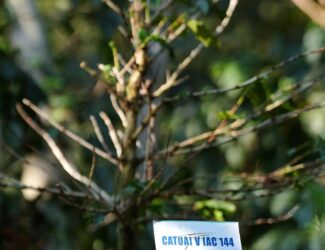
New, More Complete Arabica Genome Unveiled by Italian Consortium for Effective Variety Development
In a significant stride towards enhancing the future of coffee cultivation, scientists from the Istituto di Genomica Applicata (IGA), a private, nonprofit research center based in Italy, have released an improved genome assembly for Coffea Arabica Bourbon. The unveiling of this updated genome promises to empower breeders in developing resilient and high-performing coffee varieties.
The genome assembly is an advancement over the first fully open-access C. arabica genome, which was initially sequenced and published in 2018 by the same consortium in collaboration with World Coffee Research (WCR). The new assembly, generated using modern sequencing technologies, offers a more comprehensive analysis of arabica’s chromosomal structure, encompassing previously inaccessible regions.
Dr. Michele Morgante, one of the study’s authors, highlighted the ease of genome assembly with advanced technologies, emphasizing the crucial insights gained into the structure, function, and evolution of the genomes inherited from its progenitor species, C. canephora (robusta) and C. eugenioides.
The researchers conducted a genomic analysis of 174 samples, revealing a surprising lack of genetic diversity within the arabica species. However, they also identified increased diversity in certain coffee cultivars at specific genomic regions, attributed to chromosomal abnormalities, deletions, and genetic segments from robusta-arabica hybridization.
Dr. Jorge Berny, WCR Research Scientist in Plant Breeding & Genomics, emphasized the importance of leveraging the untapped diversity within the species for genetic improvement. Breeding programs can utilize this diversity to develop varieties with desirable traits such as resistance to pests and diseases, as well as climate resilience.
The study, led by Drs. Simone Scalabrin, Michele Morgante, and Gabriele Di Gaspero of IGA, underscores the impact of interspecific introgression in a species with relatively low diversity like C. arabica. The findings emphasize the need for breeding programs to incorporate and recombine this diversity to ensure the development of significantly improved and sustainable coffee varieties.
Funding for this groundbreaking research was provided by WCR member companies illycaffè and Lavazza, showcasing a collaborative effort between private entities and the scientific community to advance coffee research.
Coffea Arabica Bourbon Genome Insights
Coffea arabica, a polyploid species resulting from hybridization between C. canephora and C. eugenioides, possesses four copies of the eleven chromosomes typical of the genus Coffea, totaling 44 (2n = 4x = 44). The genome’s allotetraploid nature, doubling arabica’s chromosome number, has been further elucidated through the sequencing, assembly, and prediction of genes and repetitive sequences.
The updated genome assembly and the original version’s methodologies are detailed in articles by Scalabrin et al., providing insights into the polyploidization event and chromosomal aberrations generating genetic diversity in arabica germplasm.
User Acknowledgement and Access to Genome Data
The Italian partnership led by illycaffè and Lavazza, in collaboration with World Coffee Research, has made the Coffea arabica genome available for research purposes on a non-profit basis. Users accessing the genome data acknowledge the non-patentable nature of the data, agree to comply with scientific research and publication guidelines, and commit to citing the relevant articles.
The data providers assume no responsibility for potential infringements of patent, copyright, trademark, or other proprietary rights. They also disclaim responsibility for the correctness, completeness, quality, and reliability of the information and results obtained from the data. Additionally, the providers are not liable for the handling of the data by third parties, particularly following unauthorized access to World Coffee Research networks and systems.
This collaborative effort and the release of the updated genome assembly mark a pivotal moment in coffee research, opening avenues for the development of more resilient and diverse arabica coffee varieties.



